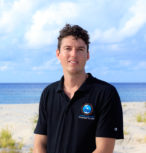DNA reveals the past and future of coral reefs
New DNA techniques are being used to understand how coral reacted to the end of the last ice age in order to better predict how they will cope with current changes to the climate. James Cook Univer

From 2005 to 2022, the main node of the ARC Centre of Excellence for Coral Reef Studies was headquartered at James Cook University in Townsville, Queensland (Australia)








Abstract:
The processes that drive speciation in the marine environment are a constant source of debate among evolutionary biologists. Geographic isolation is considered the primary evolutionary force, where species evolve in allopatry due to physical barriers which act to isolate populations. Coral reefs however, represent a challenge to this understanding. They contain the most diverse vertebrate communities in the world despite existing in a medium where physical barriers are rare. Many coral reef fish also co-exist with closely related taxa which they are known to hybridise with in the wild. The presence of viable hybrids demonstrates a lack of reproductive barriers among many coral reef fishes. So how does diversity originate and how is it maintained in these high gene flow environments? Genetic and genomic evidence suggest that natural selection can lead to speciation in the absence of physical barriers. This study proposes to use genomic scans to investigate the role of natural selection in the maintenance of diversity among two groups of hybridising species. Contemporary patterns of selection will also be compared among populations to understand the interplay between geographic isolation and localised selection.
Biography:
Sam completed his BSc. (Hons.) in Marine Science at Curtin University where he studied hybrid reef fish at Cocos (Keeling) Islands and Christmas Island in the Indian Ocean. He then worked as a research intern at King Abdullah University of Science and Technology (KAUST) in Saudi Arabia. This time, studying colour polymorphism in coral reef fish and joining expeditions to the remote Phoenix Islands Protected Area in the Central Pacific. Upon returning home, Sam spent a memorable year living in a shack in Shark Bay, Western Australia. He worked as an Aquarist, Curator and Dive Master in the world heritage site and after spending a little too long away from civilization he decided he was ready to do a PhD. Sam is studying the role of natural selection and hybridisation in the evolution of coral trout (Plectropomus) and pygmy angelfish (Centropyge). His research focuses on the Coral Sea where he will combine genetic and ecological tools to study these species.
New DNA techniques are being used to understand how coral reacted to the end of the last ice age in order to better predict how they will cope with current changes to the climate. James Cook Univer
A new study on the effects of climate change in five tropical countries has found fisheries are in more trouble than agriculture, and poor people are in the most danger. Distinguished Profess
James Cook University researchers have found brightly coloured fish are becoming increasingly rare as coral declines, with the phenomenon likely to get worse in the future. Christopher Hemingson, a
Researchers working with stakeholders in the Great Barrier Reef region have come up with ideas on how groups responsible for looking after the reef can operate more effectively when the next bleaching
Abstract: As marine species adapt to climate change, their heat tolerance will likely be under strong selection. Individual variation in heat tolerance and its heritability underpin the potential fo
Abstract: The Reef Ecology Lab in KAUST’s Red Sea Research Center explores many aspects of movement ecology of marine organisms, ranging from adult migrations to intergenerational larval dispersal
Abstract: Macroalgal meadows are a prominent, yet often maligned component of the tropical seascape. Our work at Ningaloo reef in WA demonstrate that canopy forming macroalgae provide habitat for ad
Abstract: Sharks are generally perceived as strong and fearsome animals. With fossils dating back at least 420 million years, sharks are not only majestic top predators but they also outlived dinosa
Abstract: Connectivity plays a vital role in many ecosystems through its effects on fundamental ecological and evolutionary processes. Its consequences for populations and metapopulations have been
Abstract: Evolution of many eukaryotic organisms is affected by interactions with microbes. Microbial symbioses can ultimately reflect host’s diet, habitat range, and even body shape. However, how
Abstract: The past few years have seen unprecedented coral bleaching and mortality on the Great Barrier Reef (GBR) but the consequences of this on biodiversity are not yet known. This talk will expl